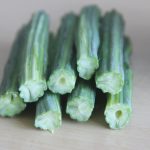
Pumpkin (kaddu) known as the national vegetable of India, is a versatile vegetable, cultivated both as a climbing plant and a creeper, indicating it’s adaptability. Pumpkins are a type of squash known for their round shape, orange color, and ribbed skin. They are associated with the fall season and often used in cooking for pies, soups, and roasted dishes. Additionally, they symbolize Halloween when carved into jack-o’-lanterns. Nutritionally, pumpkins are high in vitamins A and C, fiber, and antioxidants. They can be prepared in various ways and included in both sweet and savory recipes. Pumpkin seeds, or pepitas, are edible and provide protein, healthy fats, and minerals. Some of the benefits of consuming pumpkin are listed below:
- Supports eye health- Vitamin A is essential for good vision, particularly for its role in rhodopsin, a pigment that aids in low light adaptation in the retina. Pumpkin is a rich source of beta-carotene, which the body converts to vitamin A, supporting eye health. Beta-carotene also acts as an antioxidant, protecting the eyes from oxidative stress and reducing the risk of age-related macular degeneration and cataracts. Additionally, carotenoids like lutein and zeaxanthin found in pumpkins help guard against harmful light and oxidative damage. Vitamin C and E are other antioxidants in pumpkins that support eye health by protecting against oxidative damage and maintaining blood vessel health. Zinc is a trace mineral vital for retinal health and vitamin A function, and it aids in the synthesis of visual pigments. Deficiency in zinc can lead to vision problems, such as night blindness, with pumpkin seeds being a rich source. Omega-3 fatty acids, present in pumpkin seeds and oils, are crucial for cell membrane integrity, benefiting retinal health and potentially reducing the risk of dry eye syndrome and other eye issues. Additionally, the antioxidants and vitamins in pumpkins help alleviate inflammation, which can assist in managing conditions like uveitis and enhance overall eye comfort. The high water content in pumpkins supports hydration, which is essential for tear production and the prevention of dry eyes. Regular consumption of these nutrients contributes to overall eye health.
- Aids digestion- Pumpkin is high in dietary fiber, which is important for healthy digestion by promoting regular bowel movements and preventing constipation. It helps maintain a healthy digestive tract and supports gut health while its high water content keeps the digestive system hydrated. Natural enzymes in pumpkin aid in breaking down food and nutrient absorption, enhancing overall digestive efficiency. Additionally, pumpkin is low in FODMAPs, making it suitable for those with digestive sensitivities like IBS, and it serves as a prebiotic, nourishing beneficial gut bacteria to improve digestion and immune function. Pumpkin’s fiber acts as a prebiotic, nourishing beneficial gut bacteria, which supports digestion, nutrient absorption, and immune function. Its fiber and water content promote fullness, helping prevent overeating and aiding in weight management, thus positively affecting digestive health. Additionally, pumpkin’s antioxidants may protect the stomach lining, reducing the risk of gastric ulcers and aiding in the healing of existing ones. Regularly eating fiber-rich foods like pumpkin can help prevent digestive disorders, lower the risk of colorectal cancer, and manage symptoms of conditions like GERD (Gastroesophageal reflux disease). Pumpkin is mild and easy on the digestive system, making it suitable for those with sensitive stomachs or digestive issues.
- Promotes healthy skin- Vitamin A, obtained from beta-carotene in pumpkins, is vital for skin health, aiding in cell turnover and preventing dryness while helping to reduce fine lines and repair skin. Vitamin C is essential for collagen production, enhancing skin elasticity, reducing wrinkles, and protecting against damage from free radicals and UV rays. Vitamin E acts as an antioxidant, supporting hydration and preventing aging signs by shielding skin cells from oxidative stress. Beta-carotene provides antioxidant protection, reduces inflammation, and promotes healthy skin appearance. Zinc is crucial for regulating oil production, aiding wound healing, and addressing acne and skin conditions. Additionally, pumpkins’ high water content keeps skin hydrated, contributing to elasticity and reducing dryness. Pumpkins are rich in antioxidants like lutein and zeaxanthin, which protect the skin from environmental damage and can help reduce dark spots and discoloration for a more even skin tone. Their anti-inflammatory compounds alleviate redness and irritation, benefiting conditions like acne and eczema by calming inflammation and enhancing overall skin health. Additionally, natural enzymes in pumpkin, such as papain, provide gentle exfoliation, which removes dead skin cells, unclogs pores, and promotes a smoother, brighter complexion.
-Triparna







